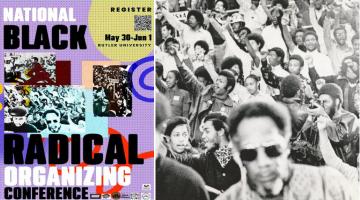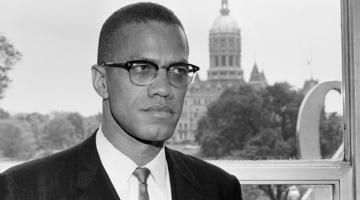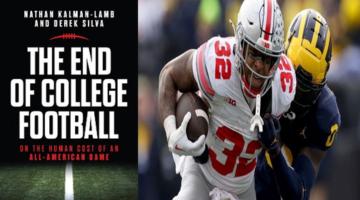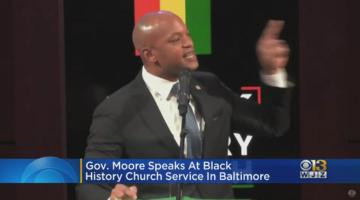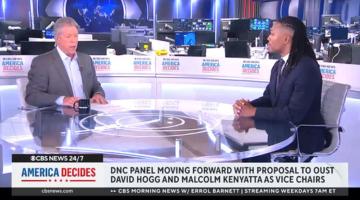Protesters demonstrating against the trial of the Mangrove Nine, West London, 1970. Catalogue reference: MEPO31/21 (3) - The National Archives UK
Black communities once turned righteous fury into systemic change, but today’s outrage over slights like Shedeur Sanders’ NFL draft slide rarely sparks organized resistance. The blueprint for liberation still exists; the question is whether we will dust it off or continue to mistake viral hashtags for revolution.
The snowflakes that began to pelt Chicago on an early January weekend in 1979 were bigger and wetter than anyone could remember, eventually burying the city under two feet of snow, shutting down O’Hare International Airport for only the second time ever, and producing snowdrifts that resembled a lumpen Sahara of marshmallow-white sand, swallowing cars, collapsing roofs, and disabling “L” trains.
The transit cars that remained operational, however, were just as problematic, skipping stops in the city’s African American neighborhoods and whizzing off to the lily-white northwestern suburbs, stranding Black commuters and reducing public transportation to a taxpayer-funded private shuttle service for whites.
That was the last straw for Chicago’s Black electorate that had little to show for more than a half-century of loyalty to the most powerful big-city machine in U.S. history. Through the city’s pharaoh-like Mayor, Richard J. Daley—known both affectionately and derisively as “Boss”— and his byzantine network of aldermen and Democratic precinct captains, City Hall doled out a few crumbs—a job on the city payroll here, an endorsement there, a pint of cheap whiskey, a canned ham, maybe a bed in a nursing home—to African American voters in exchange for their vote. When carrots didn’t work, the machine wasn’t shy about brandishing the stick, threatening to evict a tenant from public housing, or withholding a welfare check from anyone who dared to vote against the machine.
Daley lost the white vote in 1963, but overwhelming support from African American voters re-elected him. That did nothing, however, to replenish affordable housing stocks, nor abate police terror against communities of color. Blacks were denied all but the most menial patronage jobs, accounting for scarcely one in every 30 managers in the City of Big Shoulders. When a 24-year-old Jesse Jackson met with Daley about job prospects in 1965, Daley offered him a job as a toll booth operator, despite his college degree and a letter of recommendation from North Carolina’s governor, a fellow Democrat.
After Daley died unexpectedly five days before Christmas in 1976, Black Chicagoans, turned out for the 1979 primary– three months after the avalanche– in then-record numbers to elect a white lakefront liberal, Jane Byrne, thinking she would be more responsive to African American communities.
If anything, she was worse.
Beginning in 1980, a group of about 20 Black activists, led by a muckraking African American newspaper columnist named Lutrelle “Lu” Palmer, began plotting to field their own mayoral candidate, holding political education courses in an unheated community center, registering voters and raising enough money to elect Chicago’s first African American Mayor, Harold Washington.
Washington would die only months after he was re-elected to a second term, but his policies set the standard for progressive, big-city governance, and shone a light on the grassroots movement that catapulted him to office. Washington’s election also raises a critical question about African Americans who continue to express indignation at the racial injustices done to our communities, from a racial melee on an Alabama riverfront to Shedeur Sander’s epic slide in the NFL draft, but can’t seem to muster an effective and organized response like Black Chicagoans 45 years ago.
Or to put it another way, what happened to the radical Black political imagination and how can it be revived?
To be sure, imagination has been Africans’ most potent weapon in opposing settler colonialism. As W.E.B. DuBois noted in his classic study, Black Reconstruction, enslaved Blacks forced Abraham Lincoln’s hand by sabotaging their slaveholder’s crops, organizing sit-down strikes to protest their treatment and win concessions, or simply walking off the plantations, headed North. Similarly, the Montgomery bus boycott was an act of genius, as was the lunch counter sit-in movement, and the Black Panthers’ protest on the steps of the California statehouse while armed with .357 Magnums, 12-gauge shotguns and .45 pistols.
In 1964, the mostly African American neighborhoods on Washington DC’s east side were overrun with rats, which bit sleeping children. A Black activist named Julius Hobson trapped 12 of these rats in cages that he strapped to the roof of his station wagon. The blogger Rachel Gita Garp described what happened next:
“Then he drove to the white, wealthy neighborhoods — which didn’t have a rat problem – with a loudspeaker and signs threatening to release the rats.
Hobson told the press that “‘a DC problem usually is not a problem until it is a white problem,” and so he decided to “go ahead and make it a white problem.”
For multiple Saturdays, Hobson held “Rat Relocation Rallies” in Georgetown, one of the richest and whitest neighborhoods in DC. He loudly repeated his threats, raising the stakes by claiming he had a “rat farm” in the city where he and his associates kept chicken coops full of rats. He vowed that all the rats would soon be released in their neighborhood if the government didn’t act.
Because many members of city and federal offices lived in Georgetown, this quickly got their attention. The press also loved the story and wrote about it extensively as it unfolded – often exaggerating the specifics.
Within a short time, Hobson’s strategy proved successful: DC finally agreed to fund rat extermination programs in the affected neighborhoods.
Another fun twist to the story: the threats were all a bluff. Hobson didn’t have any more rats than he had in the cages he displayed. There were no rat farms or chicken coops full of rats. But he didn’t need them. He just needed to force those in power to see the smallest bit of the problem – to stop them from pretending it was invisible – to achieve success.”
Such acts of creative resistance are seldom seen today although African Americans, for the most part, retain an intuitive understanding of the fundamental role that racism plays in determining our life outcomes. We seem unable, however, to channel that consciousness into a plan of action, and our ire is typically reserved not for sleights to the Black community but for individual celebrities and athletes such as Sanders, the record-setting University of Colorado quarterback who was expected to go in the first round but wasn’t picked until the fifth because of his “bad attitude,” according to personnel managers quoted anonymously in the legacy media.
Across social media channels, the broad consensus among African Americans is that “bad attitude” is white settlers’ code for “uppity n!$$er,” similar to their loathing of the heavyweight boxing champion Jack Johnson. Many have noted that like Sanders and his father, the ex-NFL superstar Deion Sanders, the former New York Giants quarterback, Eli Manning, and his father, Archie, told the San Diego Chargers in 2004 that the younger Manning had no intention of playing for the team, and suffered no recriminations from the NFL. In a social media post, the Chicago Defender, a legendary African American newspaper, wrote:
“They didn't punish Shedeur Sanders for how he played. They punished him for what he represented.
A brash, Black, confident quarterback with fame, success — and two parents who poured into him — didn't fit the NFL's storybook mold. So they made an example out of him.
And if you've ever been overlooked, talked about behind closed doors, or told to "stay in your place" simply for standing tall in who you are — you know exactly how this feels.
Writing for the ESPN online publication, Andscape, an African American journalist, Jason Reid, aped several other high-profile Black sportswriters, in writing:
“Let’s get something straight about quarterback Shedeur Sanders’ nightmarish experience in the NFL draft: It had nothing to do with racism.”
The profligate hiring of an African American professional class for the sole purpose of disciplining Black demands for racial justice has purged radical Black activists like Palmer and Hobson from the public discourse over time, beginning in earnest with the Reagan administration and reaching its nadir under Obama. Similar to Argentine dissidents during that country’s Dirty War, radical Black thinkers have been disappeared, and our capacity for solving our most vexing problems along with them. As one example, might Palmer or Hobson reimagine the NFL’s humiliation of Sanders as the springboard for a broader movement challenging an arrangement in which Black athletes earn billions of dollars for wealthy white men instead of their own impoverished communities?
The absence of revolutionary vision has in turn limited the number and effectiveness of institutions like labor unions, organizations like the Student Nonviolent Coordinating Committee and even the Black church, all of which had an outsized role in democratizing movements between roughly the defense of the Scottsboro Boys—nine African American teens falsely charged with the rape of two white women in Alabama in 1931—and Jesse Jackson’s 1984 presidential campaign.
Still, there is reason to hope that the Black radical imagination might soon make a comeback as evidenced by the intense level of interest in Shedeur Sanders and the anger sparked by the racist critique of his play and character. The Black people who were glued to news stories about Sanders' fate in the NFL appear ripe for a movement to right the ship, and ready to fight on their own behalf.
The challenge for African Americans is converting thoughts into action, film into reality, words into deeds, and anger into transformative social movements. The revolutionary vision did not disappear.
Jon Jeter is a former foreign correspondent for the Washington Post. He is the author of Flat Broke in the Free Market: How Globalization Fleeced Working People and the co-author of A Day Late and a Dollar Short: Dark Days and Bright Nights in Obama's Postracial America. His work can be found on Patreon as well as Black Republic Media.



